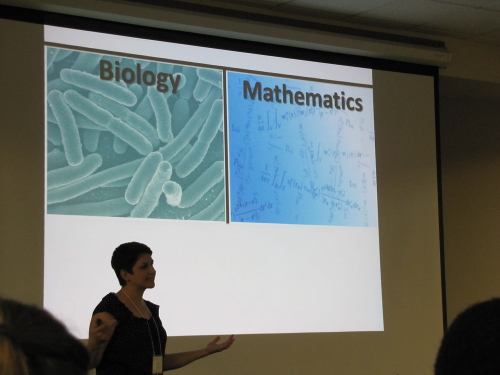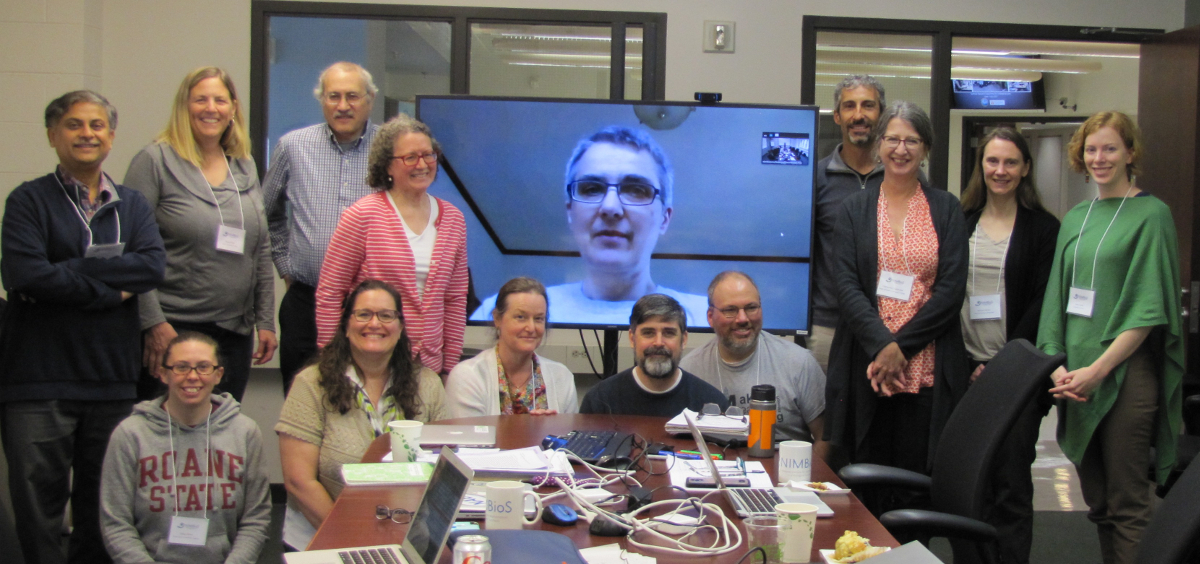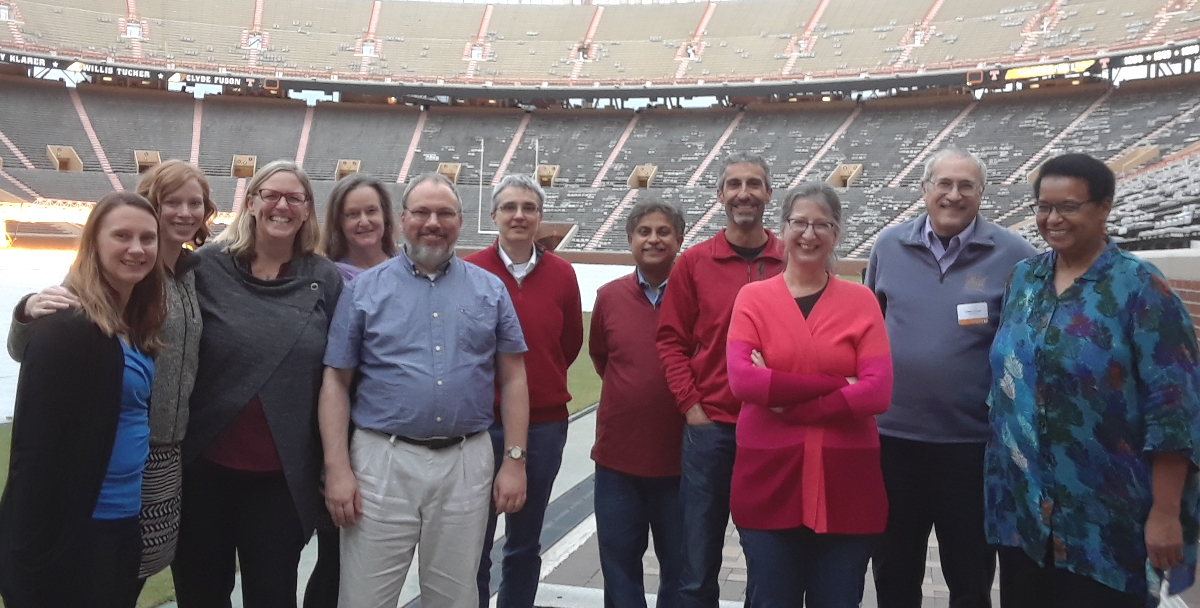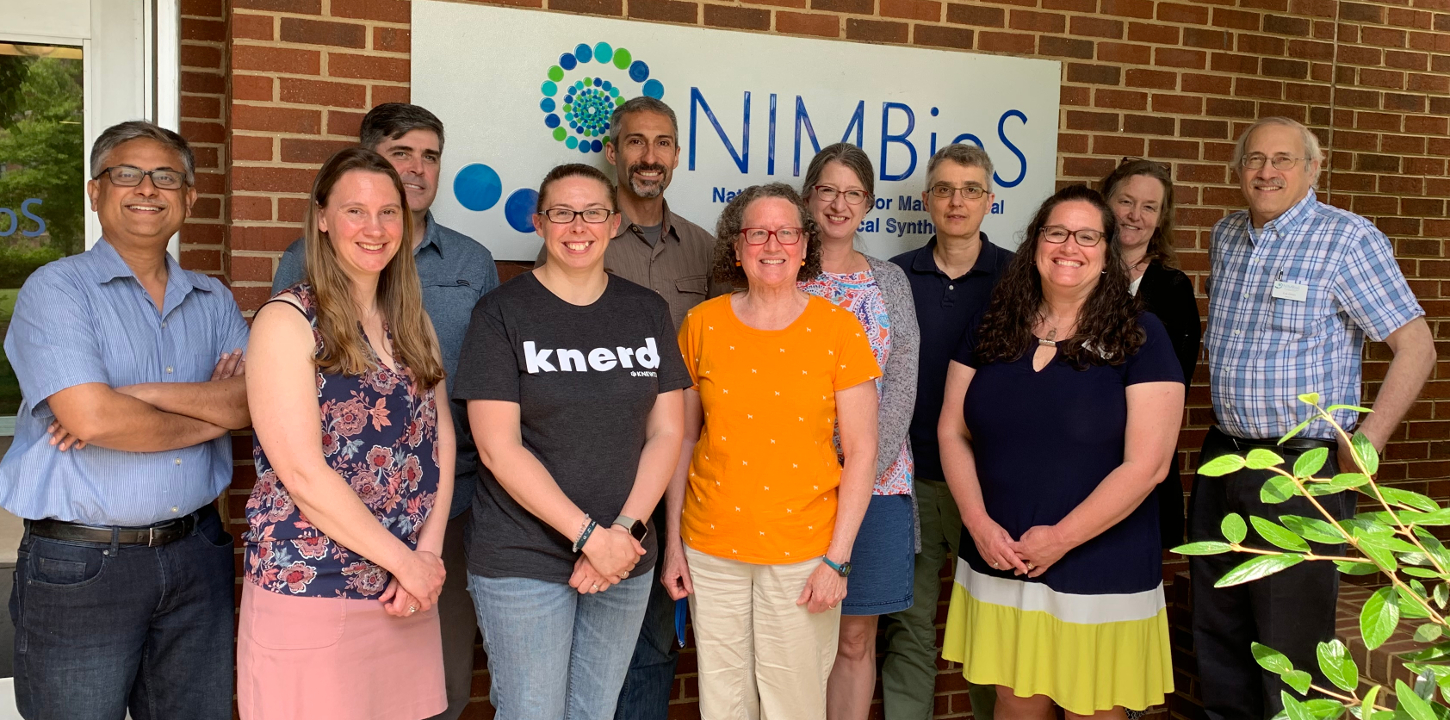| Description | Participants | Summaries | Products |
|---|
NIMBioS Working Group:
Quant Bio@Community College

Topic: Developing new solutions to improve student quantitative biology skills: A focus on community colleges
Meeting dates: Apr 26-28, 2018; Oct 25-27, 2018; May 30-Jun 1, 2019
Organizers:
Jillian Miller, Mathematics, Roane State Community College
Stacey Kiser, Biology, Lane Community College
Kristin Jenkins, Director, BioQUEST
Ahrash Bissell, Director of Strategic Partnerships, EdReady Manager, The NROC Project, Monterey Institute for Technology and Education
Objectives: Biology is becoming an increasingly quantitative discipline, and preparing students to succeed requires more emphasis on quantitative skills and quantitative reasoning, the ability to apply quantitative skills in a biological context. Acquiring strong quantitative biology skills presents a challenge to all students, but students starting at community colleges face additional barriers we cannot ignore. Over 40 percent of undergraduates are enrolled at community colleges, with disproportionate numbers of students typically underrepresented in STEM starting their college careers at the community colleges. Over half of community college students are referred to remedial math courses, and spending time in remedial courses reduces significantly a student's chance to complete a degree. New models for providing remediation in a more effective and less problematic way are being developed, including interdisciplinary remediation by placing remedial skills units in introductory courses like biology. It is challenging to develop and implement interdisciplinary models in part because biology faculty are, in general, poorly prepared to teach mathematical concepts beyond the methods they themselves are familiar with, and mathematics faculty are ill-equipped to teach mathematics in a biological context. To develop resources that will help faculty and students learn quantitative biology skills will require the combined effort of practitioners from math and biology education. The goal of this working group is to synthesize educational research on quantitative biology and remedial mathematics education at community colleges, apply this information to identify core quantitative biology skills and develop supporting educational and professional development resources for both two- and four-year biology faculty.

Meeting Summaries
| Mtg # | Dates | Agenda | Summary | Photo | Evaluation |
|---|---|---|---|---|---|
| 1 | April 26-28, 2018 | TBA | Link | TBA | |
| 2 | October 25-27, 2018 | Link | Link | - | |
| 3 | May 30-Jun 1, 2019 | TBA | Link | TBA |
Meeting 2 Summary. The primary goal of the second meeting was to advance the three projects launched during the first working group meeting. The survey group has conducted and analyzed interviews of community college faculty to identify challenges in teaching quantitative biology and is using this information to develop a national needs survey. The survey outcomes will be used to inform the design of professional development programming. A second group is constructing a matrix that aligns quantitative skills with biology content, with associated Open Education Resources (OER) that support these quantitative biology skills is being constructed to support the professional development and the broader community. A third group is working on a proposal for an NSF Research Coordination Network for Undergraduate Biology Education (RCN-UBE). The RCN UBE will build a community of two-year faculty interested in promoting quantitative skills in introductory biology; this community will be enlisted to adapt OERs for introductory biology and both participate in and lead professional development. The three project groups will continue to develop these components, with support from monthly full group updates. We are requesting support for a third meeting that will allow us to leverage the work of this group to design and implement professional development to promote student success through improved quantitative skills.
 |
| Meeting 1 participants. Back row (l to r): Vedham Karpakakunjaram, Stacey Kiser, Louis Gross, Suzanne Lenhart, Claudia Neuhauser (virtual), Ahrash Bissell, Christianne Nieuwsma, Melissa Aikens, Lisa Corwin. Seated (l to r): Jillian Miller, Sondra LoRe, Kristin Jenkins, Greg Wiggins, Tony Weisstein. |
 |
| Meeting 2 participants (l to r): Melissa Aikens, Lisa Corwin, Stacey Kiser, Kristin Jenkins, Anton Weisstein, Claudia Neuhauser, Vedham Karpakakunjaram, Ahrash Bissell, Christianne Nieuwsma, Louis Gross, Linda Grisham. Not pictured: Suzanne Lenhart, Sondra LoRe, Jillian Miller, Greg Wiggins |
 |
| Meeting 3 participants: Vedham Karpakakunjaram, Melissa Aikens, Greg Wiggins, Jillian Miller, Ahrash Bissell, Suzanne Lenhart, Christianne Nieuwsma, Claudia Neuhauser, Sondra LoRe, Kristin Jenkins, Louis Gross. (Lisa Corwin, Samuel Donavan, and Stacey Kiser participated remotely.) |
NIMBioS Working Groups are chosen to focus on major scientific questions at the interface between biology and mathematics. NIMBioS is particularly interested in questions that integrate diverse fields, require synthesis at multiple scales, and/or make use of or require development of new mathematical/computational approaches. NIMBioS Working Groups are relatively small (up to 10 participants), focus on a well-defined topic, and have well-defined goals and metrics of success. Working Groups will meet up to 3 times over a two-year period, with each meeting lasting up to 2.5 days.
A goal of NIMBioS is to enhance the cadre of researchers capable of interdisciplinary efforts across mathematics and biology. As part of this goal, NIMBioS is committed to promoting diversity in all its activities. Diversity is considered in all its aspects, social and scientific, including gender, ethnicity, scientific field, career stage, geography and type of home institution. Questions regarding diversity issues should be directed to diversity@nimbios.org. You can read more about our Diversity Plan on our NIMBioS Policies web page. The NIMBioS building is fully handicapped accessible.
NIMBioS
1122 Volunteer Blvd., Suite 106
University of Tennessee
Knoxville,
TN 37996-3410
PH: (865) 974-9334
FAX: (865) 974-9461
Contact NIMBioS


